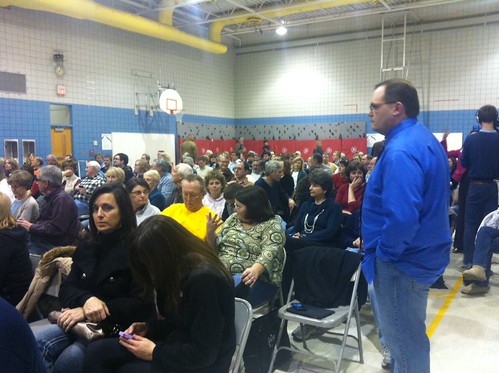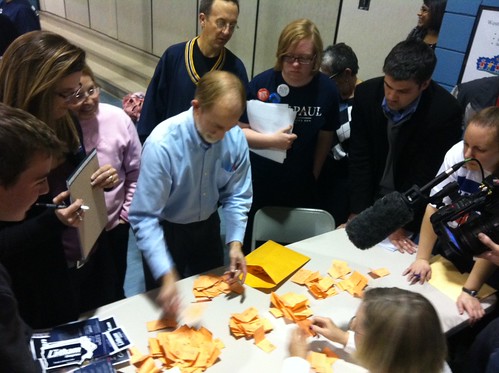I was traveling much of the day, and only belatedly have a chance to post this account of the caucus I went to. Enjoy.
WEST DES MOINES – Steve Deace looks like the only guy here with a tie. No jacket, shirt untucked – the tie is key. He paces the gym floor of Westridge Elementary School, looking a little distracted, because he has to give a speech on behalf of Newt Gingrich, and then he has to go on CNN and explain the caucuses to Piers Morgan.

“Four years ago,” he says, “this room looked like a Romney rally.” He basically had same job that he has now, working as a conservative radio host. He supported Mike Huckabee. “The governor got creamed here,” says Deace, “and I hung my head, and then I jumped in my car and heard the networks calling it for him.”
Deace carries an endorsement from Huckabee on his website. (So does Rick Santorum.) The Friday before the caucuses, when Deace endorsed Gingrich, it shook the social conservative cosmos hard enough for CNN and the BBC and a Norwegian think tank to call him up and analyze the decision. I’d talked to Deace before about what evangelicals wanted from a candidate, what they would and wouldn’t forgive, so I found his home precinct, joined the polite media scrum, and watched him caucus.
The caucus process changes from precinct to precinct. In this part of West Des Moines, it’s remarkably quiet and staid. Voters file in to the gym by 7, but there’s a crowd, so the time will be extended by a bit. Each candidate can have a spokesman, who talks for two minutes about why to back his candidate. In West Des Moines, only Michele Bachmann, Jon Huntsman, and Buddy Roemer are lacking for spokesmen.
He expects to lose. “If I can win over 5 people,” he says, “I’d call it a win.” He’s prepped, because listeners have been asking him to explain why and how he could endorse Newt, and he’s written an essay for them, but he’s ready to wing it tonight. His decision is easy to explain, easy to defend.
“There’s been maybe been 25 percent of the backlash I expected,” he says. “It’s really the media that has blown this up into a bigger event, as some sort of fight between evangelicals. The media is like: ‘Why don’t you endorse the most Jesus candidate?’ There is a stereotype, which I think we perpetuate ourselves, that this is a little bit like high school, okay? You’ve got the jocks over here, and the nerds over here, and the sluts over here, and the stoners over here. Even though you’re all in the same school, you’re supposed to roll with your clique. And I sat at the wrong lunch table, so to speak.”
The media, not real evangelical Christian voters, are the ones saying this. Deace chats with his wife and neighbors, checks in on his son and two daughters – enraptured by iPads, sitting on the floor – as the room fills up. At the entrance, precinct captain Scott Dadisman is hurridly filling out party registration changes for people need to become Republicans again. Bobby Singh, sporting a turban and talking to his University of Iowa student daughter, had voted for Barack Obama in 2008. “Never again!” he tells me. He’s basically conservative, but 2008 was a mistake. Singh gets his new party registration, ready to support Michele Bachmann.
Deace’s fellow spokesmen settle in, checking their remarks with varying degrees of nervousness. Ian Marlenee, a high school student and McDonalds employee, has prepared two version of a Ron Paul speech, two and three minutes long. Tracy Sheets, a nurse who just recently moved over to Rick Santorum, tries to boil away the repetive parts of her message, say something fresh. “Everyone thinks of him as a social conservative,” she says, “but he’s got a great economic plan. He’s the whole package.”
The caucus starts late. Dadisman has a minor problem: There are two spokesmen who want to sell Ron Paul to the crowd. Marlenee, who has a speed impediment and has trouble pronouncing the letter “R,” lets a veteran named Cary Peterson take the spot. But Deace goes first.
“One of the biggest problems facing this country is the loss of the rule of law,” he says. “I know a lot of you were very involved in defeated those three judges last year.” He’s referring to three judges who voted to legalize gay marriage, then got curbed by voters. “I’m just here to tell you, that effort never happens without Newt Gingrich’s help. He helped behind the scenes.”
Deace has two minutes to speak, and he only uses 100 seconds. He walks off, and a caucus-goer shouts that she didn’t the name of the big guy who looks like a younger, healthier Meat Loaf.
“Forgive the arrogance of the media,” he says. “My name is Steve Deace. Thank you.”
Deace is hard to follow. Perry’s spokesman relies completely on talking points straight from the candidate’s ads. Paul’s spokesman is powerful, telling a story of military service, but doesn’t say much about the candidate. Santorum’s spokeswoman, the nurse, has too much to say. “He put forth legislation to deal with radical Islam,” she explains. “He put forth a lot of different legislation, dealing with – uh, I’m sorry, I’m really nervous. He’s been on the trail of radical Islam, and that’s a threat to our country.”
The speeches are over, and the caucus-goers write the names of their preferred candidates on yellow paper.

The count happens in plain view. A few of us take notes when one pile of ballots is finished, and Dadisman knows how many votes they got. Smallest pile first: Michele Bachmann, 2. Jon Huntsman is next with 3, even though she’s from Iowa and he’s made pains never to come here. Rick Perry gets 23. Newt Gingrich gets 30, Rick Santorum gets 38, Ron Paul comes in second place with 42. Romney’s pile is so massive that we’re left with suspense about the exact margin of his landslide. He gets 123 votes. The Romney people smile and head home.
Deace had to head out earlier, to make those media commitments. He was a pessimist. “Newt had a chance to do very well here, before he let Mitt Romney bury him under negative ads and didn’t fight back,” he sighs. “These sorts of voters like winners.”
Iowa Caucus Coda: The Wrong Lunch Table
Advertisement